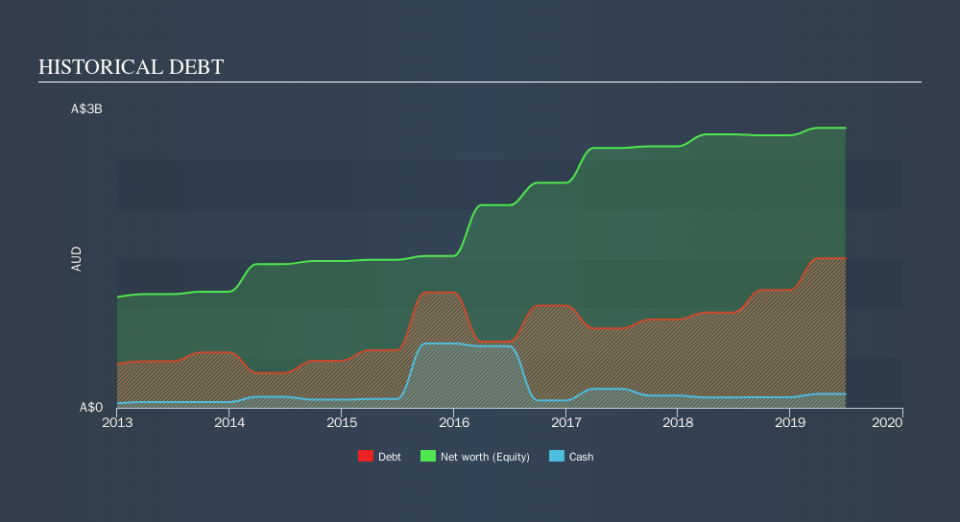Qube Holdings (ASX:QUB) Has A Pretty Healthy Balance Sheet

Legendary fund manager Li Lu (who Charlie Munger backed) once said, 'The biggest investment risk is not the volatility of prices, but whether you will suffer a permanent loss of capital. So it seems the smart money knows that debt - which is usually involved in bankruptcies - is a very important factor, when you assess how risky a company is. We can see that Qube Holdings Limited (ASX:QUB) does use debt in its business. But should shareholders be worried about its use of debt?
What Risk Does Debt Bring?
Generally speaking, debt only becomes a real problem when a company can't easily pay it off, either by raising capital or with its own cash flow. In the worst case scenario, a company can go bankrupt if it cannot pay its creditors. However, a more common (but still painful) scenario is that it has to raise new equity capital at a low price, thus permanently diluting shareholders. Having said that, the most common situation is where a company manages its debt reasonably well - and to its own advantage. The first thing to do when considering how much debt a business uses is to look at its cash and debt together.
Check out our latest analysis for Qube Holdings
How Much Debt Does Qube Holdings Carry?
You can click the graphic below for the historical numbers, but it shows that as of June 2019 Qube Holdings had AU$1.50b of debt, an increase on AU$967.1m, over one year. On the flip side, it has AU$139.9m in cash leading to net debt of about AU$1.36b.
How Strong Is Qube Holdings's Balance Sheet?
According to the last reported balance sheet, Qube Holdings had liabilities of AU$346.5m due within 12 months, and liabilities of AU$1.59b due beyond 12 months. Offsetting these obligations, it had cash of AU$139.9m as well as receivables valued at AU$326.8m due within 12 months. So its liabilities total AU$1.47b more than the combination of its cash and short-term receivables.
Qube Holdings has a market capitalization of AU$5.37b, so it could very likely raise cash to ameliorate its balance sheet, if the need arose. However, it is still worthwhile taking a close look at its ability to pay off debt.
In order to size up a company's debt relative to its earnings, we calculate its net debt divided by its earnings before interest, tax, depreciation, and amortization (EBITDA) and its earnings before interest and tax (EBIT) divided by its interest expense (its interest cover). Thus we consider debt relative to earnings both with and without depreciation and amortization expenses.
As it happens Qube Holdings has a fairly concerning net debt to EBITDA ratio of 5.1 but very strong interest coverage of 11.0. So either it has access to very cheap long term debt or that interest expense is going to grow! We saw Qube Holdings grow its EBIT by 8.2% in the last twelve months. That's far from incredible but it is a good thing, when it comes to paying off debt. When analysing debt levels, the balance sheet is the obvious place to start. But ultimately the future profitability of the business will decide if Qube Holdings can strengthen its balance sheet over time. So if you want to see what the professionals think, you might find this free report on analyst profit forecasts to be interesting.
Finally, while the tax-man may adore accounting profits, lenders only accept cold hard cash. So it's worth checking how much of that EBIT is backed by free cash flow. Over the last three years, Qube Holdings reported free cash flow worth 12% of its EBIT, which is really quite low. That limp level of cash conversion undermines its ability to manage and pay down debt.
Our View
When it comes to the balance sheet, the standout positive for Qube Holdings was the fact that it seems able to cover its interest expense with its EBIT confidently. However, our other observations weren't so heartening. To be specific, it seems about as good at managing its debt, based on its EBITDA, as wet socks are at keeping your feet warm. We would also note that Infrastructure industry companies like Qube Holdings commonly do use debt without problems. When we consider all the factors mentioned above, we do feel a bit cautious about Qube Holdings's use of debt. While debt does have its upside in higher potential returns, we think shareholders should definitely consider how debt levels might make the stock more risky. Of course, we wouldn't say no to the extra confidence that we'd gain if we knew that Qube Holdings insiders have been buying shares: if you're on the same wavelength, you can find out if insiders are buying by clicking this link.
Of course, if you're the type of investor who prefers buying stocks without the burden of debt, then don't hesitate to discover our exclusive list of net cash growth stocks, today.
We aim to bring you long-term focused research analysis driven by fundamental data. Note that our analysis may not factor in the latest price-sensitive company announcements or qualitative material.
If you spot an error that warrants correction, please contact the editor at editorial-team@simplywallst.com. This article by Simply Wall St is general in nature. It does not constitute a recommendation to buy or sell any stock, and does not take account of your objectives, or your financial situation. Simply Wall St has no position in the stocks mentioned. Thank you for reading.

 Yahoo Finance
Yahoo Finance 
